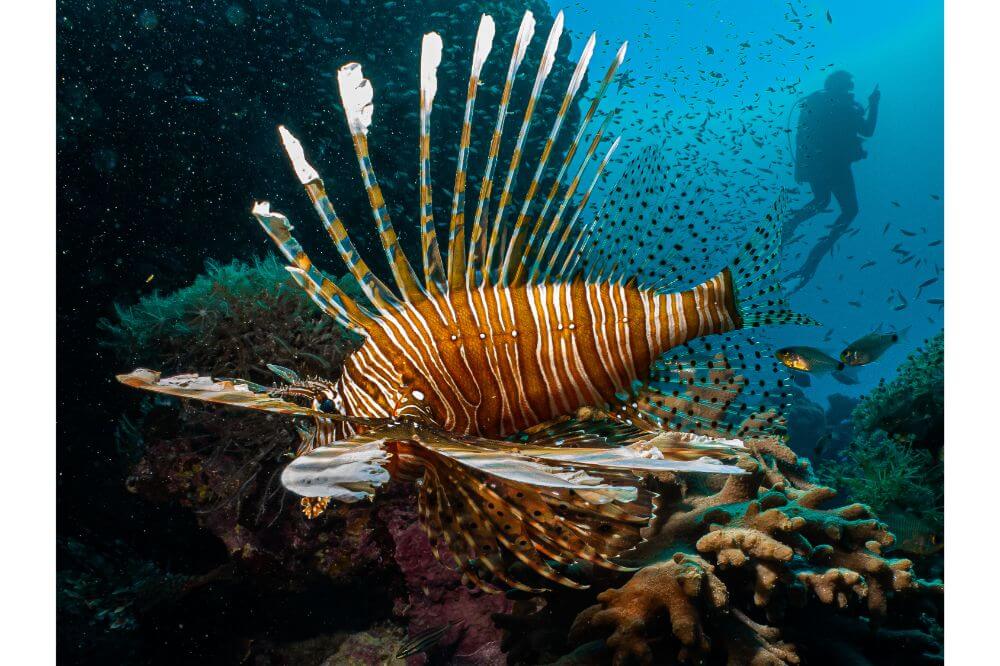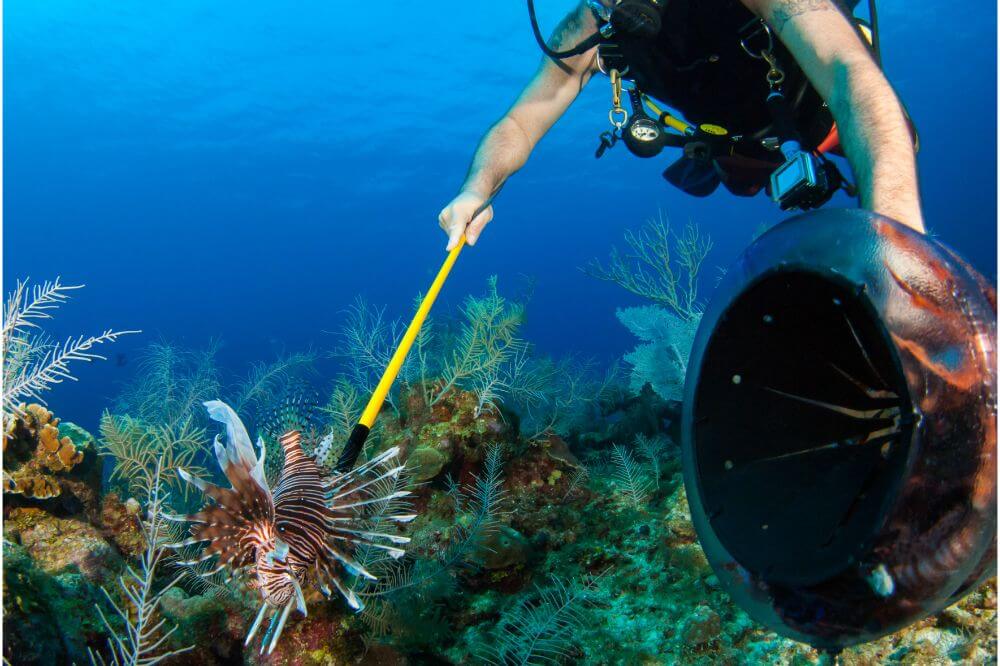When it comes to exotic fish, nothing beats the lionfish.
Their stunning appearance is why so many people have lionfish in their aquariums.
It might be fine for some to have a lionfish in an aquarium, but experiencing these animals in their natural habitat will leave you more impressed.
This article provides the essential information you need to safely dive with these stunning creatures.
Contents
Basic Facts
In terms of their appearance, the lionfish is one of the most unique-looking fish.
Lionfish tend to be either maroon or brown with vertical white stripes that cover the head and body.
These fish can grow to around 18 inches in length.
The tentacles below the mouth and above the eyes give it a very unique appearance.
Even more noticeable are the many spines, including around 13 dorsal spines, 11 dorsal soft rays, three anal spines, and six to seven anal rays.
It is vital to note that lionfish spines excrete a neuromuscular toxin.
If the spines of a lionfish are touched, that venom gets into your bloodstream and immediately starts causing sweating, respiratory distress, extreme pain, paralysis, and sometimes death.
Yes, that is right, touching a lionfish can kill you.
Where to Find Lionfish
Lionfish were originally only found in the Indian Ocean and the South Pacific Ocean, known as the Indo-Pacific region.
They can be found in many different coastal waters, including in Micronesia, from the north to the south of Japan, from the southern point of Korea to the East coast off of Australia, around New Zealand, and from Western Australia and Malaysia, all the way over to the UK’s Pitcairn Island and Polynesia.
With that being said, due to the popularity of the lionfish in the aquarium trade, this fish has become very common in North America, with many people releasing them into the wild when they can no longer care for them.
Due to this, lionfish are now a highly invasive species that can be found off the eastern coast of North America from New York down to Bermuda.
This is a problem because lionfish are excellent hunters, the effects of which are now being seen.
They threaten many native fish and plant species found in the waters in the western Atlantic Ocean.
You can find lionfish as deep as 300 feet, and they enjoy many different environments, including coral reefs, artificial reefs, mangroves, grassy and hard bottoms.
They’re not choosy in terms of where they like to live, thus making it relatively easy for scuba divers to find them.

When to Scuba Dive with Lionfish
Spawning or mating season is always the best time to see any fish because this is when the largest groups gather in pretty shallow waters.
Lionfish mate year-round in warm waters, making them always present for scuba divers to see.
Since lionfish spawn year-round, they can generally always be found in groups.
In fact, female lionfish can spawn as often as every three days, which is another reason why they pose such a massive threat to native species in North America.
Diving with Lionfish: Some Tips
If you want to see lionfish, the best time to do so is at sunrise and sunset, as this is when the fish are the most active.
Interestingly, if you dive on artificial structures, particularly artificial coral reefs such as within shipwrecks, you’ll have the best chances of seeing lionfish.
Lionfish seemed to love barrel sponges, so, for your best chances at seeing them, try to find barrel sponges.
Also, lionfish tend to reside in the deeper parts of the water column and at depths of over 1,000 feet.
So, there are tons of lionfish that hang out just below the limits of recreational diving.
In addition, keep in mind that there are bound to be larger predators where you see lionfish and other such fish, so keep your head on swivel for things like sharks.
You definitely don’t want to pick a lionfish up with your bare hands because the spines are highly poisonous and may very well cause death.
Even thick rubber diving gloves may not be enough to protect you from those spines.
Wrapping Up
Lionfish are very beautiful but also quite dangerous.
Being submerged several dozen feet underwater is already dangerous, so you don’t want to be dealing with a lionfish-induced health emergency. Instead, observe them from a distance and respect them for their deadly beauty.





